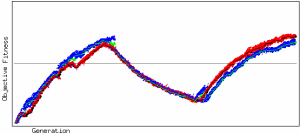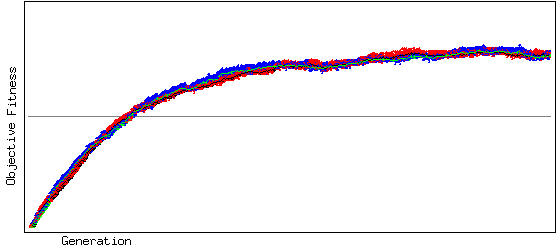

| Overspecialization: The selection pressure to outcompete
one another can help ensure that any weaknesses in a player are discovered
and the individual destroyed. However, the ability to focus on the opponent's
weakness can provide an easy way to win. This may produce degenerate players
that over-specialize on opponents weaknesses, and fail to learn a task
in a general way. For example, I develop my pawn structure skills to beat
you; you develop knight/bishop skills to beat me; I develop rook skills
to beat you; etc. My learning pawn structure might lead to being
better than you, but if I've been neglecting all my other skills they may
be forgotten and in the long term I have not necessarily become an objectively
better player in general.
In this experiment, for each game between 'a' and an opponent,
determine D, the dimension or skill in which they are most different. The
winner is the player who is greater in dimension D. i.e. If a[D] > Opponent(i)[D]
then 'a' gets one fitness point, otherwise fitness remains unchanged. So
in this game only one skill is relevant when playing against a particular
player - but which skill matters depends on who you play. However, in this
game, a change that increases your score against one player never decreases
your score against another player - this makes the game transitive. Look
for the fact that fitnesses do not climb as high as they do in experiment
1a where players only have one skill. This is caused by the 'atrophication'
of skills that are not currently being used.
Relativism or Intransitivity occurs when there is no clear direction of improvement for a skill, and the only point of reference is the opponent. |
 |